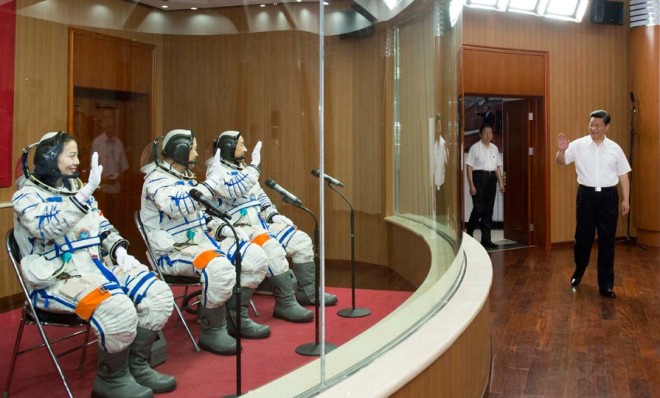Is China pulling ahead in the space race?
The world's most populous nation just sent up its fifth manned mission in a decade, while U.S. astronauts are stuck hitching rides into orbit


A free daily email with the biggest news stories of the day – and the best features from TheWeek.com
You are now subscribed
Your newsletter sign-up was successful
Three Chinese astronauts blasted into orbit on Tuesday. Their two-week mission will be the longest in the Chinese space program's history. The crew will practice docking with the Tiangong 1 (Heavenly Palace 1) space module, a prototype space station that has been orbiting Earth since September 2011. The mission is viewed as an important step toward China's goal of building a full-fledged, permanently manned station by 2020.
China's leap forward — its fifth manned mission in a decade — comes at a time when the U.S., with its shuttle fleet retired, no longer has the means to send astronauts into space on its own. Americans have to hitch rides on Russian spacecraft, at least for the time being.
Still, China has a lot of catching up to do before it can dream of truly pulling ahead — after all, China is still trying to reach milestones the U.S. and Soviet space programs blasted past in the 1960s and 1970s. China's Tiangong 1 space station is half the size of the first space station — Salyut 1 — that the Soviets sent up in 1971.
The Week
Escape your echo chamber. Get the facts behind the news, plus analysis from multiple perspectives.

Sign up for The Week's Free Newsletters
From our morning news briefing to a weekly Good News Newsletter, get the best of The Week delivered directly to your inbox.
From our morning news briefing to a weekly Good News Newsletter, get the best of The Week delivered directly to your inbox.
But China has been making great strides at a time when NASA is regrouping. And China is benefiting from its rivals' trailblazing of decades past. "They don't have to reinvent the basic technologies for spaceflight," Australian space analyst Morris Jones tells The Associated Press.
That, notes Eoin O'Carroll at the Christian Science Monitor, is helping China set its sights beyond low-Earth orbit. "The country is working to deliver a robotic rover to the moon," O'Carroll says, "and, sometime after 2020, a manned moon mission."
China may have a long way to go, but its slow, steady approach is beginning to pay off. Lisa Grossman notes at New Scientist that China's commitment to its space program is reflected in a growing budget, while "NASA's human spaceflight program has struggled under changing budgets and political whims."
That could help China reach new frontiers ahead of everyone. "So as long as the money holds out and political stability reigns," the conservative Heritage Foundation's Dean Cheng tells New Scientist, "they might well get to some place like Mars or establish a lunar presence, precisely because they are persistent and willing to spend the money and make the effort."
A free daily email with the biggest news stories of the day – and the best features from TheWeek.com
Not everyone is convinced. Leo Mirani at Quartz says China indeed "has plenty of reasons to feel chuffed." But, he says, the U.S. is leading in a new kind of space race that China has not even entered yet.
It is true that America — the state — is no longer capable of putting people into space. But Americans — the people — are racing to be able to do what is presently the preserve of sovereign nations. Three companies — Boeing, Elon Musk's SpaceX, and Sierra Nevada Corporation — hope to carry astronauts to the International Space Station before the end of its life [in 2020]. SpaceX is already ferrying payloads back and forth.And that's just the big boys. Lots of other private companies enter each year to win prizes designed to spur innovation in manned space flight and moon landings. All of these are privately run and at little cost to taxpayers. More importantly, they spur competition, which was crucial to the last century's space race.So China may look like it's on the way to winning the space race. But increasingly, China's race is one that hardly anyone else is taking part in. [Quartz]
Harold Maass is a contributing editor at The Week. He has been writing for The Week since the 2001 debut of the U.S. print edition and served as editor of TheWeek.com when it launched in 2008. Harold started his career as a newspaper reporter in South Florida and Haiti. He has previously worked for a variety of news outlets, including The Miami Herald, ABC News and Fox News, and for several years wrote a daily roundup of financial news for The Week and Yahoo Finance.
-
 Properties of the week: pretty thatched cottages
Properties of the week: pretty thatched cottagesThe Week Recommends Featuring homes in West Sussex, Dorset and Suffolk
-
 The week’s best photos
The week’s best photosIn Pictures An explosive meal, a carnival of joy, and more
-
 The ‘ravenous’ demand for Cornish minerals
The ‘ravenous’ demand for Cornish mineralsUnder the Radar Growing need for critical minerals to power tech has intensified ‘appetite’ for lithium, which could be a ‘huge boon’ for local economy
